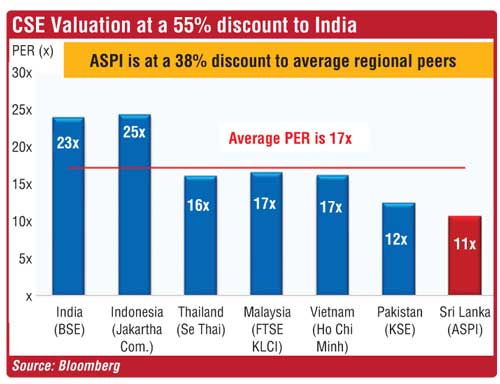Reuters: Sri Lankan shares posted their second straight session of gains on Friday, further moving away from the lowest close in more than four months hit this week, as foreign investors picked up beaten down shares.
The Sri Lanka parliament on Thursday passed tax reforms that should simplify the tax system, widen the tax base and increase government revenue, as agreed with the International Monetary Fund in exchange for a $1.5 billion, three-year loan.
The Colombo stock index ended 0.22 percent higher at 6,375.86.
The bourse fell 0.2 percent during the week, its eight straight weekly fall. As of Friday’s close, it shed 4.4 percent since July 27.
Shares of Ceylon Cold Stores Plc ended 1.6 percent higher, while Asiri Hospitals Plc closed up 6 percent, Browns Investments Plc closed 6.5 percent higher and Dialog Axiata Plc ended 0.9 percent firmer.
Foreign investors net bought 78.8 million rupees ($516,044.53) worth of shares, extending the year-to-date net foreign inflow to 27.8 billion rupees worth equities.
“We have seen active participation of foreign investors after the inland revenue bill was passed,” said Atchuthan Srirangan, senior research analyst, First Capital Holdings PLC.
“We are seeing buying interest in blue chips. We expect market to see more active participation from both local and foreigners next week onwards,” he added.
The bill, Sri Lanka’s major tax reform since independence from Britain in 1948, seeks to expand the tax net and stamp out evasion.
Turnover stood at 688.1 million rupees, less than this year’s daily average of around 859.9 million rupees.
($1 = 152.7000 Sri Lankan rupees)
The Sri Lanka parliament on Thursday passed tax reforms that should simplify the tax system, widen the tax base and increase government revenue, as agreed with the International Monetary Fund in exchange for a $1.5 billion, three-year loan.
The Colombo stock index ended 0.22 percent higher at 6,375.86.
The bourse fell 0.2 percent during the week, its eight straight weekly fall. As of Friday’s close, it shed 4.4 percent since July 27.
Shares of Ceylon Cold Stores Plc ended 1.6 percent higher, while Asiri Hospitals Plc closed up 6 percent, Browns Investments Plc closed 6.5 percent higher and Dialog Axiata Plc ended 0.9 percent firmer.
Foreign investors net bought 78.8 million rupees ($516,044.53) worth of shares, extending the year-to-date net foreign inflow to 27.8 billion rupees worth equities.
“We have seen active participation of foreign investors after the inland revenue bill was passed,” said Atchuthan Srirangan, senior research analyst, First Capital Holdings PLC.
“We are seeing buying interest in blue chips. We expect market to see more active participation from both local and foreigners next week onwards,” he added.
The bill, Sri Lanka’s major tax reform since independence from Britain in 1948, seeks to expand the tax net and stamp out evasion.
Turnover stood at 688.1 million rupees, less than this year’s daily average of around 859.9 million rupees.
($1 = 152.7000 Sri Lankan rupees)
(Reporting by Ranga Sirilal; Editing by Sherry Jacob-Phillips)
